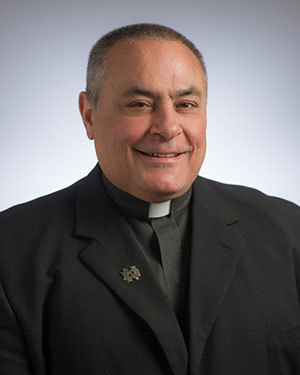 Rev. Joseph V. Corpora, C.S.C.
Rev. Joseph V. Corpora, C.S.C.
The Catholic Church is the largest of the Christian churches in the nation, and more than half of the Catholics in the United States who are under the age of 25 are Latinos. Barring massive changes in birthrates and immigration, a majority of American Catholics will be Latinos by the year 2050. If the rise of Latino Catholics confronts the Catholic Church in America with a profound and tumultuous challenge, the University of Notre Dame’s Rev. Joseph V. Corpora, C.S.C., sees it as a blessing as well. “I think Latino Catholics might even be God’s last-ditch effort to keep the American Catholic Church truly catholic, sacramental and diverse,” he said.
Father Corpora was speaking to the participants of the Adelante Conference, a gathering of 120 campus ministers from 43 colleges and universities nationwide hosted by Notre Dame’s Office of Campus Ministry June 3-6 to discuss how better to serve and engage Latino Catholic students.
Father Corpora directs Catholic School Advantage, an initiative of Notre Dame’s Alliance for Catholic Education program to increase the percentage of Latino children enrolled in Catholic schools, and he also serves as associate director of Latino ministry at Notre Dame, where he lives among undergraduate students in Dillon Hall. His interest in Latino ministry is more than theoretical.
Before beginning his work at Notre Dame five years ago, Father Corpora served as pastor of Holy Redeemer Parish in Portland, Oregon, from 2002 until 2009. “Holy Redeemer is a wonderful parish,” he said. “It had been a solidly middle-class, white, blue-collar parish for almost 100 years, and during the seven years that I was privileged to serve as pastor, the parish was becoming more and more Latino every day. The number of people who came to our regular Mass in Spanish grew from about 40 to 350 over those years.”
At Holy Redeemer, Father Corpora noticed and lamented “that there was not a lot of mixing of the two cultures — the long-standing Anglo-European culture and the newly arriving growing Mexican-Latino culture.” He remembers how the parish community struggled all too unsuccessfully with this misfortune “until someone had the bright idea of Sunday afternoon soccer games. The whole world plays soccer. Our parish and school were fortunate enough to have a soccer field, so we tried this and it worked wonderfully. The men played soccer and the women and children came and watched. After the game we would have a potluck lunch and people would meet informally. The only ‘agenda item’ was to talk, if they wished, about how they got to the United States.”
Latino and Anglo alike, Holy Redeemer parishioners did indeed wish to talk about how they had come to be there. “Everyone has an immigration story,” Father Corpora said. “Whether the Fisher family immigrated to Portland from Norway in 1910 with stops in Minneapolis and Fargo along the way, or the Bautista family immigrated to Portland from Cuernavaca in 1998, everyone has an immigration story.” Simple storytelling over a common meal had wonderful effects on the parish community, and Father Corpora remembered them when he emigrated from Portland to Notre Dame. At the beginning of the 2013-2014 academic year, he had an idea.
“I decided that I would invite 12 freshmen to my room for pizza and conversation,” he said. “I would invite six boys and six girls, six Latino and six Anglos, and there would only be one agenda item. Each person would be invited to tell his or her story of how they got to Notre Dame. How did I choose the students to invite? It was simple. I knew them. I knew them because they come to our weekly Mass in Spanish or they live in Dillon or I met them when they went on our Latino Freshman Retreat, or I met them while working out at the Rockne gym.”
The pizza party Father Corpora hosted that night was the first of what have since come to be called “Notre Dame Story Nights.” There have been 12 such gatherings since then — four for freshmen, three for sophomores, three for juniors and two for seniors — and 111 students and four of Father Corpora’s colleagues on the Campus Ministry staff have participated.
“I’m consistently amazed at how students, most of whom do not know each other, tell such beautiful and different stories,” Father Corpora said. “One will say ‘My grandfather was one of the Four Horsemen, so I knew from the time could talk that I would go to Notre Dame,’ and another will say, ‘My Notre Dame story began when my father wanted a better life for us and he hid himself in a big wooden box that was nailed to the bottom of a tractor-trailer and was able to cross the border and began life in the United States.’ In the days after each Notre Dame Story Night I’ll receive e-mails from students saying things like, ‘I had breakfast with Juan today in South Dining Hall. I would never have sat down with him before, but now that I met him in your room, I know him and so we had breakfast together.’”
The campus ministers at the Notre Dame Adelante Conference had discussed how they might accompany Latino students and help them grow in faith, how they might welcome departed or lapsed Latino Catholics back into the Church, how they could support and challenge Latino students and others to grow in faith. In concluding remarks to the gathering, Father Corpora spoke of hopeful efforts in such ministry at Notre Dame, including the weekly celebration of Mass in Spanish and the annual Latino Freshman Retreat.
But he particularly recommended initiatives similar to the Notre Dame Story Nights: “They cost only 70 minutes and five pizzas,” he said, “and they bring together beautiful young people with such beautiful and tender souls, people who might otherwise not have met.”
Contact: Rev. Joseph V. Corpora, C.S.C., 574-631-1601, Joseph.V.Corpora.2@nd.edu